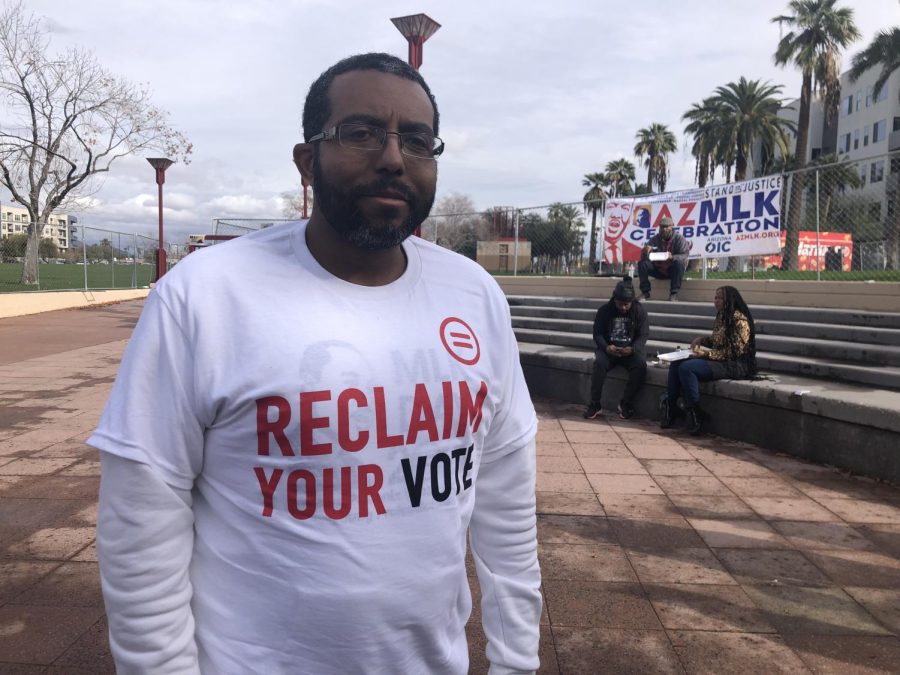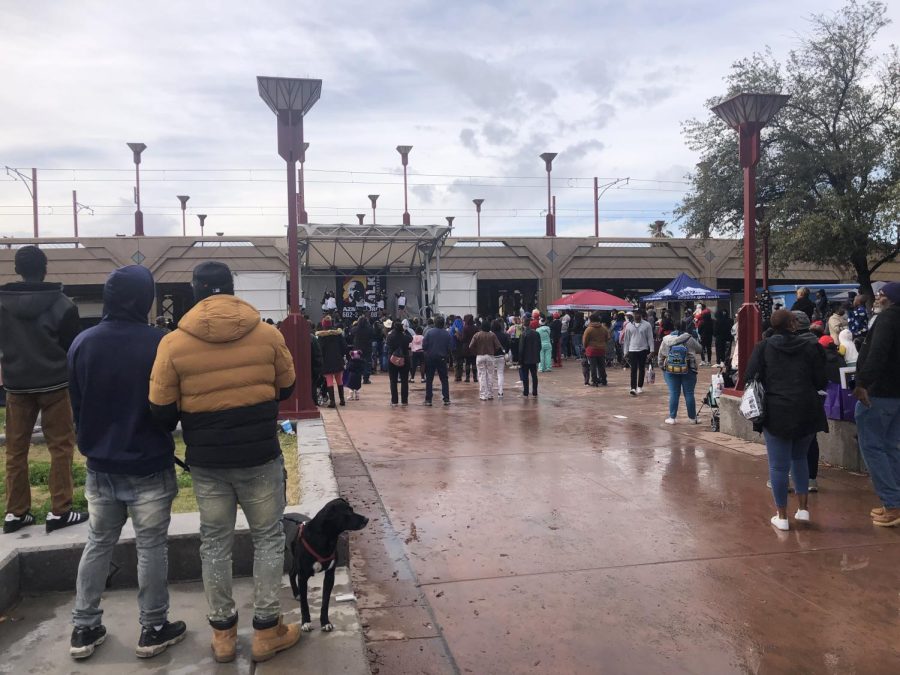Martin Luther King Jr’s dream still “alive” at MLK Phoenix celebration—but GOP voting rights obstruction concerning to many attendees
“Martin Luther King Jr. Day represents empowerment.”
(Paul Underwood) an attendee at the MLK Jr. Celebration Monday, displays message on his shirt regarding concern over voter suppression.
January 16, 2023
While voting is the right of every citizen, the push to make it inaccessible is a priority for many GOP political leaders in Congress and across state houses in the U.S.
In recent years, more than 400 anti-voter bills have been introduced in 48 states.
Republican led legislation builds on challenges to discourage people from registering to vote, to vote by mail and certainly to vote in person.
The result, in some states—a severe and compromised electorate that is not reflective of the will of the people.
Stricter voter ID laws and attempts to eliminate early voting by the GOP is unapologetically aimed at nationwide subjugation. And these measures, to no one’s surprise, are disproportionately devised to impact communities of color.
In Georgia’s recent midterm elections, voters were waiting for hours in long lines wrapped around buildings.
Sen. Raphael Warnock (D-Ga.) told reporters that he “won’t rest” until lawmakers pass national voting rights legislation renewing his push for further reforms on Martin Luther King Jr. Day.
Redrawing district lines that negatively impact the individual vote are being met with litigation and will ultimately end up on the steps of the conservative led Supreme Court.
And while celebration was in the air at the Martin Luther King Jr. Day celebration in downtown Phoenix’s Margaret T. Hance Park, so was concern over the efforts of extreme Republican’s to disenfranchise the minority vote in the U.S.
Paul Underwood, an attendee at the MLK Day event,
was mindful of the celebration around him, but decided to wear a T-shirt that displayed the words “Reclaim Your Vote” to remind everyone that the threat of voting suppression—is real.
“I’m here representing civic engagement to reach people and educate them about different voting issues that will further empower them—Martin Luther King Jr. Day represents empowerment,” Underwood said.
Underwood recalls the days when Arizona rejected a recognized MLK day as an official holiday.
Arizona was in fact, the last state in the country to recognize MLK Day as a holiday even though MLK day has seen 30 years since the anniversary of its formal recognition.
Many of those in attendance on Monday walked first thing in the morning after a standing room only service at the Pilgrim Rest Baptist Church—then on to the Margaret T. Hance Park where the outdoor festival began at 10 a.m.
Lanette Campbell has been coordinating the Arizona Martin Luther King festival for the past 17 years.
In light of the upcoming Super Bowl LVII and the events surrounding the week, much of the grounds that are usually reserved for the MLK celebration and festival were fenced off in order to “preserve” the location for, “The Super Bowl Experience” also to be held at Hance Park— as well as other various Super Bowl events scheduled in downtown Phoenix.
Still, the crowds showed up on Monday despite the rain and a sparse area that usually accommodates the still large MLK Festival gathering.
Speakers, dancing, singing, food trucks and a health fair were among the festivities of fun, mixed with a message of activism.
“It’s a very important event and holiday to celebrate Dr. King and all his attributes that he has contributed to America—not only African Americans but all Americans—so we think it’s important that this tradition lives on in history, as well as the present,” Campbell said.
When asked about the concern voiced by many attendees at the MLK Day celebration with regard to voting suppression, Campbell reflected on her optimism—“the dream belongs to each one of us—and this is what we have inside our hearts.”
“We can’t rely on the dream that America lives for us. If all of us just reach inside and figure out that we do have something to dream about in life—that’s going to get us to a better place. And I think that’s what Dr. King did for us—decided to dream and share his dream with us—some people won’t share that dream with us—but I think the dream for a better life is the best thing to do,” Campbell said.



